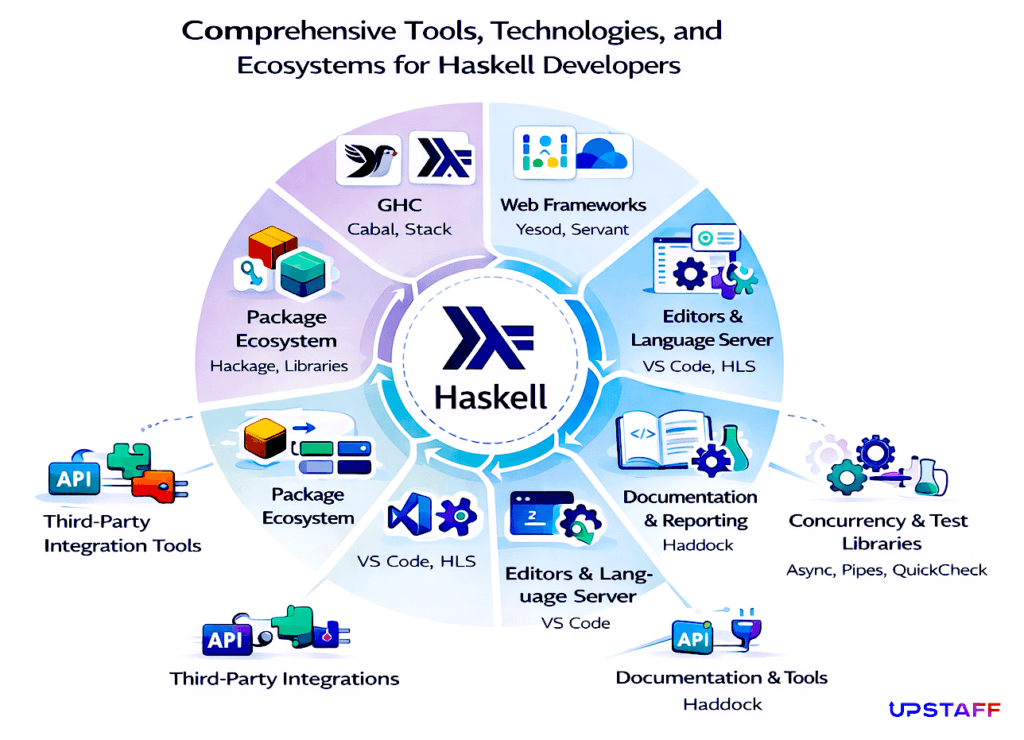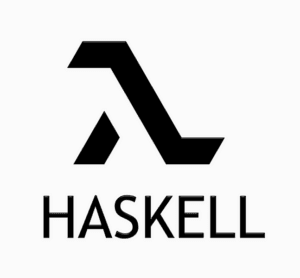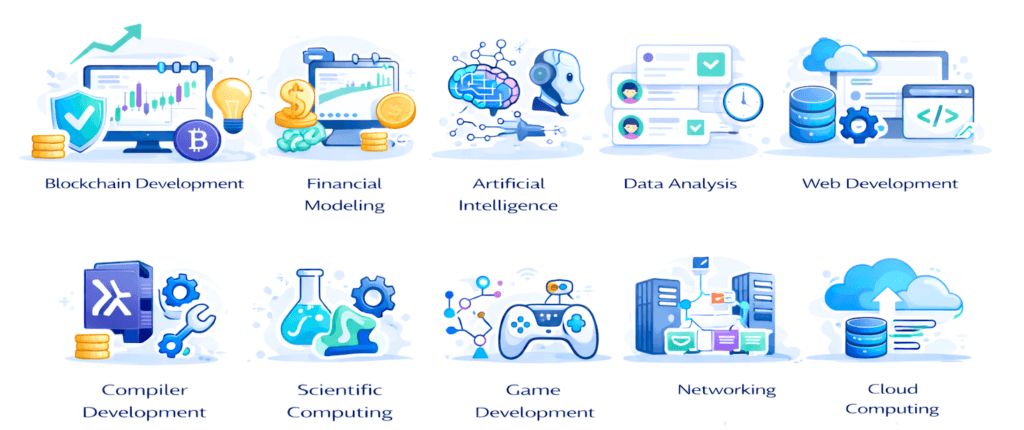Want to hire Haskell developer? Then you should know!
Table of Contents
- How and where is Haskell used?
- How to Hire Haskell Developers with Upstaff
- Quick Facts about Haskell.
- Comprehensive Tools, Technologies, and Ecosystems for Haskell Developers
- Core Compilers and Toolchain
- Build Tools and Package Management
- Documentation and Search Tools
- Web Frameworks and Servers
- Libraries for Functional Programming
- Testing and Property-Based Tools
- Database and Persistence
- Development Environments and Editors
- DevOps and Profiling Tools
- Compare Junior, Middle, Senior, and Expert/Team Lead Haskell Developer roles
- Why Choose Upstaff for Haskell Hiring?

How and where is Haskell used?
- Blockchain Development: Secure decentralized apps
- Financial Modeling: Accurate risk assessment
- Artificial Intelligence: Efficient algorithm implementation
- Data Analysis: Complex data processing
- Web Development: Scalable backend systems
- Compiler Development: Advanced language design
- Scientific Computing: High-performance computations
- Game Development: Functional game logic
- Networking: Reliable network protocols
- Cloud Computing: Distributed system management
How to Hire Haskell Developers with Upstaff
Hiring Haskell developers can be challenging due to the language’s niche status, but Upstaff simplifies the process with deep vetting, rapid matching, and risk-free trials. Our platform connects you to pre-screened experts skilled in functional programming, type safety, and high-reliability systems—ideal for finance, blockchain, and complex backend projects. How to Hire Haskell Developers with Upstaff
How to Hire Haskell Developers with Upstaff- Schedule a Free Discovery Call
Start with a quick 30-minute call with our talent expert. Discuss your project requirements, tech stack needs (e.g., GHC, Servant, Lens), team fit, timeline, and budget. This helps us understand your challenges and goals for precise matching. No commitment required—book instantly via the site. - Receive Carefully Matched Profiles
Within 1-3 days (often faster), get handpicked profiles of vetted Haskell developers from our 2K+ talent pool. Each includes experience details, skills (e.g., monads, type systems, concurrency), English proficiency, and past projects. Average start time: 48 hours—10x faster than traditional recruiting. - Interview and Validate Candidates
Review profiles, schedule interviews directly, and assess fit. Ask about real-world Haskell use cases like property-based testing (QuickCheck), web APIs (Servant/Warp), or advanced patterns (Lens, MTL). We provide full transparency with KYD (Know Your Developer) verification. - Onboard with a Risk-Free Trial
Start collaboration with a no-risk trial period. Test the developer’s integration into your team—no termination fees or hidden costs if it’s not a perfect match. Flexible models: full-time, part-time, or project-based. - Scale Securely and Transparently
Enjoy consolidated invoicing, no hidden fees, and ongoing support. If needed, we replace talent quickly. Benefit from our AI + human vetting (saving ~50 hours per hire) for reliable, high-performance Haskell experts.
Quick Facts about Haskell.
- Created in 1990 by a committee of researchers.
- Popular for projects in finance and academia.
- Entry level requires understanding of functional programming.
- Commonly used with related tech like Elm and Scala.
- Haskell’s type system avoids runtime errors like a pro!
Comprehensive Tools, Technologies, and Ecosystems for Haskell Developers
Haskell is a purely functional programming language known for its strong static typing, lazy evaluation, and advanced features like monads and type classes. Its ecosystem includes core compilers, build tools, package managers, web frameworks, libraries for concurrency and effects, testing tools, and integrations with databases and IDEs. Expert Haskell developers master these to build reliable, high-performance applications in domains like finance, blockchain, web services, and data processing. Comprehensive Tools, Technologies, and Ecosystems for Haskell Developers
Comprehensive Tools, Technologies, and Ecosystems for Haskell Developers
 Comprehensive Tools, Technologies, and Ecosystems for Haskell Developers
Comprehensive Tools, Technologies, and Ecosystems for Haskell DevelopersCore Compilers and Toolchain
Essential foundation for compiling, interpreting, and managing Haskell code.
The primary optimizing compiler for Haskell, supporting advanced extensions like GADTs, type families, and linear types. Essential for production code with high performance and strict type checking.

Interactive REPL and bytecode interpreter included with GHC. Allows rapid prototyping, debugging, and experimentation with Haskell expressions.

Installer and manager for GHC, Cabal, Stack, and HLS. Simplifies setting up and switching between different toolchain versions.
Build Tools and Package Management
Tools for project setup, dependency management, and reproducible builds.
Package manager and build system maintained by Haskell.org. Handles dependencies, building, and installation from Hackage repository.

Cross-platform tool for project management and reproducible builds. Manages GHC versions automatically and ensures consistent environments.

Central package archive for Haskell libraries and tools. Hosts thousands of open-source packages for easy discovery and installation.
Documentation and Search Tools
Utilities for generating documentation and discovering APIs.Web Frameworks and Servers
Frameworks for building type-safe web applications and APIs.
Type-level DSL for describing and implementing web APIs. Generates server/client code automatically with compile-time safety.

Lightweight Sinatra-inspired microframework. Simple routing and middleware for quick web apps and APIs.

High-performance HTTP server engine. Powers many Haskell web frameworks with fast, asynchronous I/O.
IHP (Integrated Haskell Platform)
Batteries-included framework with built-in IDE and database tools. Optimized for productivity, including code generation and schema editing.
Batteries-included framework with built-in IDE and database tools. Optimized for productivity, including code generation and schema editing.
Libraries for Functional Programming
Core libraries for advanced patterns and effects.
Composable tools for accessing and modifying data structures. Simplifies working with complex records and nested data.

Standard library for monad transformers and type classes. Enables layered effects like state, reader, and writer monads.
Testing and Property-Based Tools
Frameworks for reliable testing and verification.
Property-based testing library for automatic test case generation. Tests invariants and edge cases with random data.
Database and Persistence
Tools for data storage and querying.
Type-safe ORM used in Yesod and other frameworks. Supports multiple backends like PostgreSQL, SQLite, and MongoDB.

DSL for type-safe SQL queries on top of Persistent. Enables complex joins and queries with compile-time checks.
Development Environments and Editors
IDEs and language servers for productive coding.
Haskell Language Server (HLS)
LSP implementation for editor integration. Provides autocompletion, type info, refactoring, and diagnostics.
LSP implementation for editor integration. Provides autocompletion, type info, refactoring, and diagnostics.

Popular editor with strong Haskell support via HLS. Features debugging, formatting, and inline errors.

Highly customizable with excellent Haskell integration. Supports interactive development with GHCi.
DevOps and Profiling Tools
Tools for benchmarking, monitoring, and deployment.
Robust benchmarking library for performance measurement. Provides statistical analysis and charts for comparisons.

GUI tool for visualizing parallel execution and profiling. Helps debug concurrency issues in multi-threaded apps.
Compare Junior, Middle, Senior, and Expert/Team Lead Haskell Developer roles
| Seniority Name | Years of experience | Responsibilities and activities | Average salary (USD/year) |
|---|---|---|---|
| Junior | 0-2 years |
| $40,000 |
| Middle | 2-5 years |
| $50,000 |
| Senior | 5-8 years |
| $60,000 |
| Expert/Team Lead | 8+ years |
| $80,000-$100,000 |
Why Choose Upstaff for Haskell Hiring?
- Access rare talent in a niche language (e.g., experts in Plutus/Cardano for blockchain).
- Proven in demanding domains: fintech modeling, concurrent systems, theorem proving.
- 100% vetted network—focus on building, not recruiting.
Table of Contents
- How and where is Haskell used?
- How to Hire Haskell Developers with Upstaff
- Quick Facts about Haskell.
- Comprehensive Tools, Technologies, and Ecosystems for Haskell Developers
- Core Compilers and Toolchain
- Build Tools and Package Management
- Documentation and Search Tools
- Web Frameworks and Servers
- Libraries for Functional Programming
- Testing and Property-Based Tools
- Database and Persistence
- Development Environments and Editors
- DevOps and Profiling Tools
- Compare Junior, Middle, Senior, and Expert/Team Lead Haskell Developer roles
- Why Choose Upstaff for Haskell Hiring?
Talk to Our Expert
Our journey starts with a 30-min discovery call to explore your project challenges, technical needs and team diversity.

Yaroslav Kuntsevych
co-CEO



